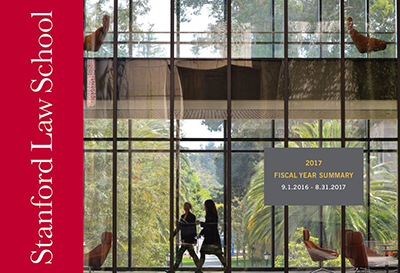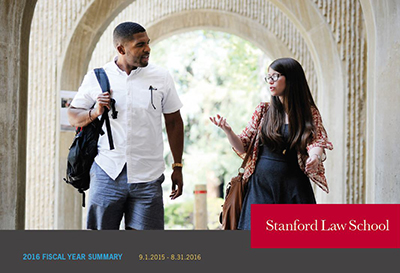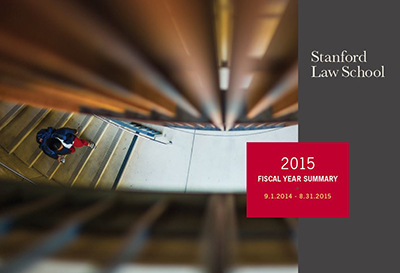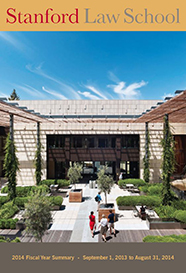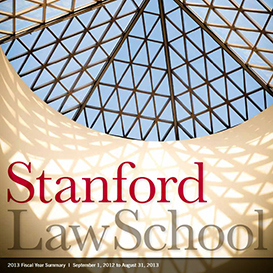
Stanford Law School
2018 Fiscal Year Summary
9.1.2017–8.31.2018
1 of 3
law schools to provide only need-based financial aid
770
client and witness meetings conducted by clinic students annually
248
unique courses taught by faculty
7:1
typical student:faculty ratio
What SLS Means to Me
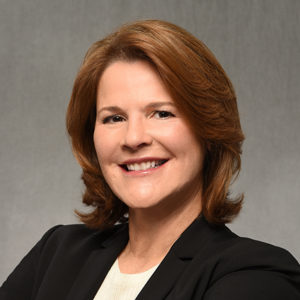
“SLS has played a pivotal role in providing me with the tools I need to succeed in my career, which is why I cannot imagine a better place to direct my support. I give back because the next generation of lawyers—regardless of their financial circumstances—should be able to take advantage of all the wonderful opportunities that SLS provides.”
—Naomi Waltman, BA ’85, JD ’88
Executive Vice President &
Associate General Counsel at CBS Corporation;
Law Fund Chair
Financial Overview
Every gift made to Stanford Law School matters. Your contributions make our institution a leader in teaching and research, competitive financial aid packages, and innovative experiential learning opportunities. Your philanthropic commitment to SLS is an investment in the future of our school.
Sources of Income

41%
University Allocation
Tuition, fees, and other general funds that the law school receives from the university
40%
Endowment
An enduring source of financial support for the law school, these assets are invested in the Stanford University endowment and are paid out at a rate of approximately 5.5% annually
13%
Gifts & Grants
Annual support that strengthens the student experience inside and outside of the classroom, creating new curricula, retaining world-renowned faculty, and engaging alumni at home and abroad
6%
Other
Income the school receives from executive education and conference fees to cover the cost of these programs and to help support other school priorities
Total Dollars Raised
$21,201,795*
*This figure includes both outright gifts and multi-year pledges committed during fiscal year 2018. “Total Dollars Raised” ($21,201,795) will be more than “Gifts and Grants” ($11,496,630) since the latter only reflects contributions received and used in fiscal year 2018.
Uses of Income
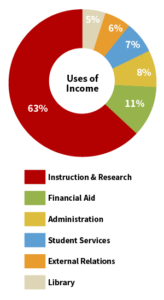
63%
Instruction & Research
Supports distinguished faculty in the classroom, clinics, and policy lab while driving innovative research
11%
Financial Aid
Provides the majority of Stanford Law School students with scholarships and financial aid
8%
Administration
Maintains essential operations, including facilities maintenance, information technology, finance, and human resources
7%
Student Services
Enhances student experience outside of the classroom through services such as the Levin Center for Public Service and Public Interest Law and the Office of Career Services
6%
External Relations
Engages alumni worldwide through communications, events, reunions, volunteer opportunities, and international programs
5%
Library
Cultivates library services and research resources, including databases, subscriptions, and technology updates
Total Law School Budget
$88,667,150
Why I Support SLS
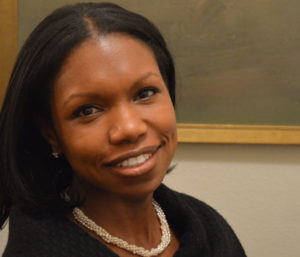
“I have maintained a strong connection to SLS since graduation for many reasons. The institution has given me the knowledge and skills to pursue a career that continues to evolve and interest me intellectually; life-long connections with friends and colleagues; and, as an alumna, the chance to remain connected to growing legal, technology, and business scholarship. As a member of the Board of Visitors, I recognize the opportunities SLS has provided me and am happy to have the chance to give back.”
—Tommie Wilson, JD ’01
Global Product Partnerships at Twitter;
Member of the SLS Board of Visitors
90
percent of endowed funds are dedicated to specific uses
76
percent of law alumni have given to SLS in their lifetimes
3,421
Number of gifts less than $1,000
230
full-time and advanced degree students enrolled in a clinic during the academic year
Invest in the Future of Legal Education
When you make Stanford Law School a philanthropic priority, you are investing in the future of legal education. At SLS, our students benefit from our robust financial aid and innovative educational opportunities, our world-renowned faculty have the resources to do impactful research, and our experiential learning programs provide our students with the skills they need to succeed.
Make a Gift
Educating Tomorrow’s Leaders
At Stanford Law School, students are the cornerstone of our community. Innovations in our clinical program, refinements of our curriculum, and our continued commitment to need-blind admissions prepare our students to meet the challenges of the legal profession.
Katie Austin, JD ’13

“The Immigrants’ Rights Clinic gave me tools to translate a client’s interests into legal objectives, legal objectives into legal strategy, legal strategy into concrete tasks, and tasks into the day’s work. I look to my clinic experience any time I tackle a new legal problem.”
Devon Gray, JD ’19
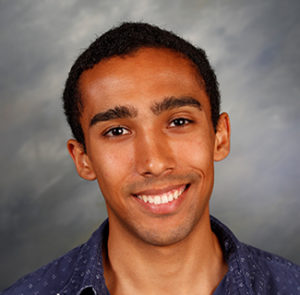
“Your financial contribution to my education has lifted a truly significant burden from my shoulders that has freed me to work in search of my passions rather than solely to pay back my loans. I hope to work for the federal government to advance a world where every citizen is able to receive fair treatment and equal access to opportunities. My scholarship has granted me a sincerely unique opportunity. It has genuinely made a substantial impact on the trajectory of my career and life as a whole.”
Vincent Sheu, JD ’18
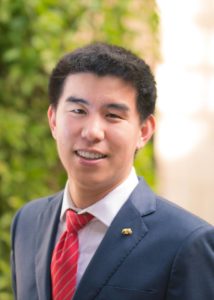
“Stanford Law’s 125th Anniversary reception in Hong Kong opened a phenomenal week, during which we learned about topics ranging from international investment in Chinese companies, the ‘one country, two systems’ statuses of Hong Kong and Macau, Chinese venture capital, private equity practices, and possible career paths for lawyers looking to make an impact on both sides of the Pacific. Now, in reflection, it is clear this trip was an incredible and rewarding experience that educated us academically as well as culturally. Many places provide an education, but Stanford Law School is the rare place that goes beyond, with institutional commitment, vision, and drive to create the immersive opportunities that truly set the SLS experience apart. Thank you!”
Supporting World-Renowned Faculty
The support of our community provides essential resources that allow us to recruit and retain faculty members who are experts in their fields. Their celebrated and innovative research enriches the student experience and elevates the quality of our institution as a whole.
Professor Ralph Richard Banks, BA/MA ’87
Ralph Richard Banks, BA/MA ’87, is the Jackson Eli Reynolds Professor of Law at Stanford Law School and Professor, by courtesy, at the School of Education. A native of Cleveland, Ohio, Professor Banks is a leading expert in family law, employment discrimination law, and race and the law. He is the author of Is Marriage for White People? How the African American Marriage Decline Affects Everyone.
Read more about Professor Banks and his scholarship here:
Professor Michael W. McConnell
A leading authority on freedom of speech and religion, the relation of individual rights to government structure, originalism, and various other aspects of constitutional history and constitutional law, Michael W. McConnell is the Richard and Frances Mallery Professor of Law and Director of the Constitutional Law Center at Stanford Law School as well as Senior Fellow at the Hoover Institution. Here, he discusses the importance of religious liberty in a diverse America.
Read more about Professor McConnell and his scholarship here:
Professor Jane S. Schacter
Jane S. Schacter, the William Nelson Cromwell Professor of Law, is a leading national expert on statutory interpretation and legislative process, constitutional law, and sexual orientation law. Her work has been published in numerous law journals, and she co-edits casebooks on constitutional law and sexual orientation law. Her most recent work has focused on various aspects of the debate over same-sex marriage, an issue that lies at the intersection of her teaching and research interests. Here, she discusses the concept of so-called “judicial activism” in contemporary times and the past.
Read more about Professor Schacter’s scholarship here:
Providing Real-World Legal Experience
SLS offers one of the most robust clinical programs in the country, a top-notch law and policy lab, and a state-of-the-art global experience. Read more about these opportunities and programs in the panels that follow.
The W.A. Franke Global Law Program
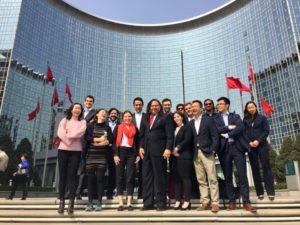
The newly established W. A. Franke Global Law Program at Stanford Law School has taken the lead in preparing students for the reality of lawyering in an increasingly global world. The program’s innovative model for training tomorrow’s law and business leaders is comprised of four elements: a 10-week immersion in international law and finance, a foundational course on global legal practice, courses that combine rigorous classroom training with intensive overseas study trips, and greater integration of comparative law and international issues into existing core courses.
“At Stanford Law, we’re training a generation of lawyers who can lead and solve problems in an increasingly interconnected world,” said Robert Daines, SLS Pritzker Professor of Law and Business, Associate Dean for Global Programs, and Senior Faculty for the Rock Center on Corporate Governance.
Through this program, SLS students do the real work of 21st century lawyers as they face transnational legal problems that require them to engage with people, legal systems, businesses, governments, and multilateral institutions from around the globe.
For more information, please visit the following link:
The Mills Legal Clinic
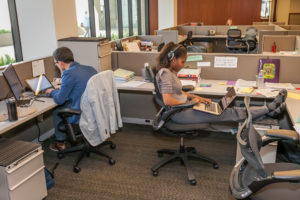
SLS has one of the most outstanding clinical programs in the country, offering 11 different clinics as part of the Mills Legal Clinic. While at SLS, students have the opportunity to participate in a variety of experiential learning programs that allow them to gain real-world lawyering skills.
Juliet Brodie, the director of the Mills Legal Clinic, describes what makes SLS’s clinical program special: “We believe the Mills Legal Clinic’s unique brand of clinical education is beyond compare. Two features in particular make it so. First, every clinic at SLS is directed by a faculty member who is considered a top lawyer in the relevant field as well as in the pedagogical enterprise of supervising novice lawyers as they handle their first cases. Second, students enroll in the clinics full time for a quarter and have no competing concurrent academic commitments. This immersion enables students to take on more responsibility for their cases than they could otherwise and presents opportunities for continual, ‘just-in-time’, and collaborative learning.”
For more information, please visit the following link:
Law and Policy Lab
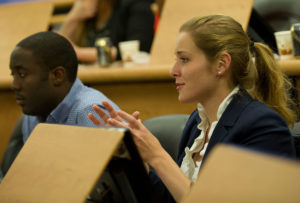
In the Law and Policy Lab students focus on finding solutions to some of our most pressing issues. Under the guidance of seasoned faculty advisers, students counsel real-world clients in an array of areas, including education, copyright and patent reform, public enterprises in developing countries, policing and technology, and energy policy.
Since the inception of the Law and Policy Lab in the 2013–2014 academic year, 100 practicums have been offered. These practicums address policy problems for real clients, using analytic approaches that supplement traditional legal analysis. The clients may be local, state, or federal public agencies or officials, or private non-profit entities such as NGOs and foundations. Typically, students assist clients in deciding whether and how qualitative or quantitative empirical evidence can be brought to bear to better understand the nature or magnitude of their particular policy problem and to identify and assess policy options.
For more information, please visit the following link:

The Law Fund
Your investment in the Law Fund helps support important institutional priorities. Below are but a small sample of the opportunities you make possible.
Educational Experience
- Supports the core curriculum through providing faculty and visiting scholar salaries
- Ensures the continued availability of a diverse array of clinics and labs, allowing students to get hands-on experience
- Helps develop the operation of centers and journals, including the Stanford Law Review
Student Support
- Enhances the student experience outside of the classroom through services and activities, such as the Stanford Criminal Justice Center and the Office of Career Services
- Provides scholarships and financial aid for the majority of students
- Maintains library services and research resources, including databases, subscriptions, and technology updates
Alumni Engagement
- Connects alumni to the law school through communications, events, reunions, volunteer opportunities, and international programs


